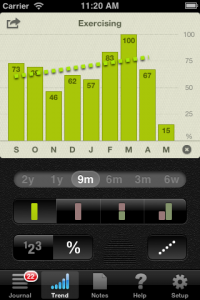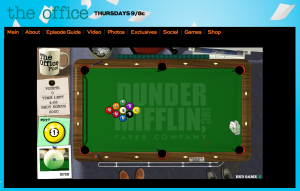More Lively Than Life is Our Motto: Better Living Through Gamification
On New Year’s Day, instead of signing up for a gym or joining a writing group, I binge downloaded apps on my iPad. Perhaps it was the grease hangover from a night of eating only chicken wings in a comedy club upstairs from a Chinese restaurant, or perhaps it was the usual grad student anxiety made worse by habitual procrastination to Academic Coach Taylor memes. Whatever the cause of my guilt, my answer was in the App Store. So, I downloaded a bunch of apps: one to count calories, another to create ambient music in order work better, harder, and faster, and another to figure out what mental roadblocks weigh me down, in order to – as the app urges – “live better every day.” To top it off, I bought a habit building app that reminds me to record whether I counted my calories, whether I worked harder, better, and faster, and whether I overcame those mental roadblocks. The app charts my progress over time and shares it with my social networks.
This remedy is one part Lifehacker’s cult of productivity, half part Anthony Robbin’s self-help-ism, and two parts Kevin Kelly’s Quantified Self. And like eating fried chicken in the dark, this remedy instantly gratifies but never quite satisfies. Like other purported technological cure-alls today, this one is identified through a neologism, is criticized as a buzzword, and is hailed by proponents as a movement. “Gamification” is this process of using game logics such as points, badges, levels, challenges, and rewards to enhance traditionally non-game experiences. This experience might be uploading your fitness milestones onto Nike+ and syncing it with your workout on the Xbox 360 Kinect; it may be boosting productivity at a call center by using leaderboards and badges; it may be competing with your roommate for tangible rewards using a sophisticated system of rules to more pleasantly accomplish household chores. It is the carrot and the stick; it is putting more life into your life.
In all these examples, there is a representational structure linking reward to achievement, cause to effect – a structure that gamification enthusiasts claim produces unprecedented behavior change. Gamification allows you to incentivize anything in your (or your employees’) life to make it more fun, more efficient, more effective. In the words of Jane McGonigal – the movement’s high priestess who galvanized a legion of marketers and game designers in that TED talk – games can make a better world and make us “SuperBetter”™ – incidentally, also the name of her latest game.
At MIT’s Futures of Entertainment Conference, a panel of gaming experts playfully refused to respond to a persistent question rising to the top of a crowdsourced backchannel – “What is the future of Gamification?” Dismissed by these experts as a a fancy name for customer loyalty programs that are a perversion of game mechanics, and disdained as “marketing bullshit,” it is easy to write off gamification as the latest marketing buzzword. However, as media scholars have witnessed in half a decade of critical deconstruction of what was known as “Web 2.0,” technological buzzwords are never empty – they are ciphers for configurations of cultural values that iteratively shape relations between people, systems, and institutions.
On The Office’s gamified website, users signed up as employees of the fictional Dunder Mifflin paper company and earned “Schrute Bucks” for making comments, posting photos and performing tasks that built engagement and buzz for the show. It didn’t take long for the site to be populated with user-generated content. In an interview with Mashable, the gamification startup Bunchball raved that “NBC loved it because they were paying all these users fake money to do real work.” Unlike the conception of pure waste that game scholars such as Roger Caillois have used to define play, the playfulness of gamification is consummately productive.
According to the Pew center’s survey of experts, gamification may retreat as a fad, but only because its mechanisms will become more entrenched and quotidian – a trajectory that Web 2.0 took in becoming simply “social media.” Therefore, despite the fatigue from yet another marketing revolution, media scholars must map the contours of Gamification’s discourses as they erect and legitimate motivational structures for narrowly predetermined behaviors in our work, leisure, and psychic lives. These are structures that capture our playfulness, our guilt, our desires, our energies, and convert them into quantifiable outcomes such as engagement in platforms, loyalty to brands, user-generated data, and user-generated content. In Blade Runner (1982), the visionary doctor proclaimed that “commerce is our goal here at Tyrell; more human than human is our motto.” And as the film has taught three decades of moviegoers, we have to ask ourselves what it means to be human. Similarly, as we reinvent our lives through gamification, we have to ask ourselves what it means to be alive.






Gamification works more often than not..and its turning out to be one of the better ways to create non game experiences!